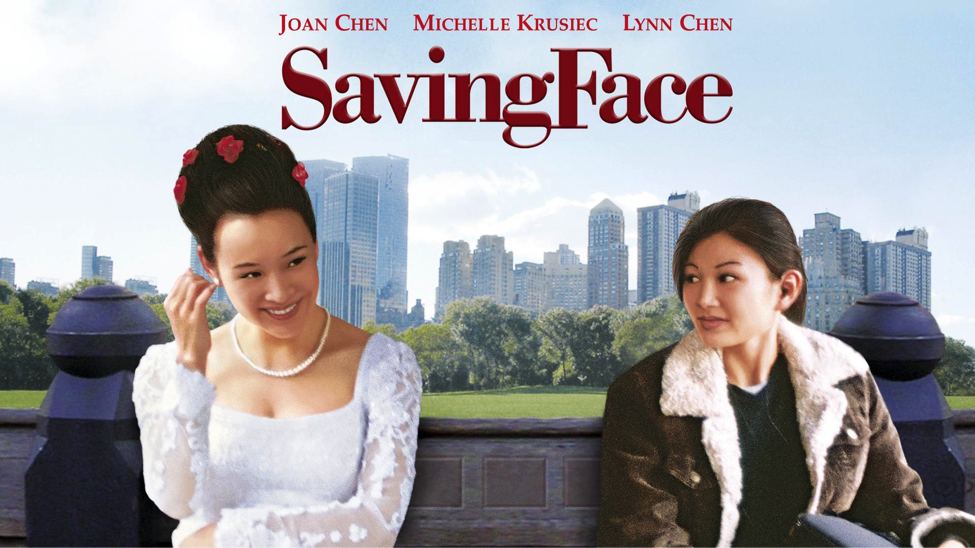Back to Asian Americans on Celluloid Timeline
Saving Face (2004)
Director and Writer: Alice Wu
Length: 91 minutes
View this film for free on the platforms below (available for rental on others):

Synopsis
Wilhemina (Wil) Pang is a lesbian Chinese American surgeon living in Manhattan. While she hides her sexuality and her budding relationship with Chinese American ballerina Vivian Shing from her traditionalist family, her widowed mother, Hwei-lan Gao, referred to as “Ma” in conversations, is also dealing with her love secret – a scandalous pregnancy with a man she refuses to name. Banished from her parent’s home in Flushing, Ma moves into Wil’s apartment for refuge. Tension grows in the house as Wil tries to maintain her underground relationship with her same-sex lover, who is more forthright about her gayness and is slowly starting to lose patience with Wil’s indecisiveness. As Wil joins the family’s mission to find her mother a suitable man to father the love child, she also starts to discover her mother’s desires and regrets. The story resolves in a happy ending with both of the heroines united with their lovers. This feel-good rom-com captures two generations of Chinese American women juggling their personal love interests and the honor, or the “face,” of their family.
Significance
Saving Face is Wu’s directorial debut. Although it was tucked away from the Hollywood mainstream’s attention as a small-budget, lesbian rom-com featuring an all Asian/Asian American cast years before the era of Crazy Rich Asian, it has an outsized impact on a generation of Asian American filmmakers, especially female filmmakers, including Ali Wong (“Always Be My Maybe”) and Lulu Wang (“The Farewell”). The leading actresses in Saving Face, Michelle Krusiec and Lynn Chen, also embarked on their own journeys in film directing in coming years.
Beside the limited budget, Alice Wu also encountered challenges finding actors who were fluent in Mandarin Chinese. Despite the difficulty, Wu refused to compromise the film’s authenticity. With the joint effort of Chinese American actors and actors from Mainland China, the film delivers a believable performance, speaking in English, Mandarin, Shanghainese, and Mandarin with an American accent, which accurately depicts the linguistic landscape of the Chinese American communities in New York City across generations. The cultural accuracy and relatability of the film is also enhanced by the characters’ reference to the collective memory of the Chinese people, such as fashion during the Sino-Japanese War and the Cultural Revolution.
The film also touches upon the colorism and anti-black racism among Chinese American communities, epitomized in Ma’s cautious reaction to Wil’s African American neighbor Jay. The tension between Jay and Ma resolved in the film with the two watching Taiwanese soap operas together, signaling Ma’s willingness to adapt and accept. Other race-related themes explored in the film are the “model minority” status of Asian Americans, the simultaneous fetishization and desexualization of Asian women, etc.
In addition to the positive critical reception it garnered in the US, Saving Face also won the Viewer’s Choice Award and was nominated for the Best Actress Award for Michelle Krusiec at the 2005 Golden Horse Film Festival, the major film festival of Taiwan. Wu and Krusiec both expressed surprise at this result given what was then considered the film’s controversial theme.
The filmmaker
Alice Wu was born to a Taiwanese immigrant family in April, 1970 in San Jose, California. She enrolled in the Massachusetts Institute of Technology at the age of 16 and later studies Computer Science at Stanford University. After earning her master’s degree, she worked as a software engineer at Microsoft until she took a 12-week screenwriting class at the University of Washington. She then decided to leave the corporate world, and to adapt the novel she wrote while working at Microsoft into a film.
After Wu’s critically acclaimed debut Saving Face in 2004, a romantic dramedy based on her own experience coming out to her Taiwanese American mother as a lesbian, the film world barely heard from her for the next 15 years, as she was tending to her ailing mother. Her second film, The Half of It was just released on Netflix in 2020. Both of Wu’s films deal with Asian American lesbian identity and parent-child relationship in Asian American families.
Back to Asian Americans on Celluloid Timeline
Further reading and listening
Newspaper Articles and Blogs
- Escobar, Natalie. “What Alice Wu Wants To Say In ‘The Half Of It‘” NPR: Code Sw!tch. May 1, 2020.
- Ito, Robert. “Alice Wu’s Lesbian Rom-Com Was Influential, but Her Follow-Up Wasn’t Easy” The New York Times, Apr. 29, 2020.
- Wu, Alice. “director’s note for Saving Face (2005)” May 27, 2005.
Podcasts
- QUEERY: “Alice Wu”
- Dyking Out: “Trailblazing w/ Alice Wu”
- They Call Us Bruce: ”They Call Us Alice Wu”
